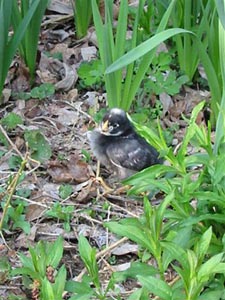Mail Order Chickens
Air Date: Week of May 16, 2003
The arrival of spring means different things to different people. For commentator Sy Montgomery, it means a fresh batch of baby chicks in the mail.
Transcript
 A 10 day old Dominique chick on her first venture outdoors. (Photo: Sy Montgomery)
CURWOOD: Springtime means longer days, budding trees, and planting seeds to harvest when the days grow short again. And for commentator Sy Montgomery, springtime means it's time to fill the coop again with freshly hatched baby chickens. A 10 day old Dominique chick on her first venture outdoors. (Photo: Sy Montgomery)
CURWOOD: Springtime means longer days, budding trees, and planting seeds to harvest when the days grow short again. And for commentator Sy Montgomery, springtime means it's time to fill the coop again with freshly hatched baby chickens.
MONTGOMERY: I ordered them on a day our country was at war, a day with six inches of snow on the ground. A day when it seemed here in New Hampshire that spring would never come. Weary of gray days and mounting sorrows, I knew what I had to do. [TELEPHONE RING] JESSICA: Cackle Hatchery, this is Jessica, how can I help you? MONTGOMERY: I called Cackle Hatchery. I'd like to order ten Dominiques. JESSICA: Okay. Did you want them in pullets or straight run? MONTGOMERY: Oh, pullets, please. Dominque's, a rare old breed, were the chickens of the Pilgrims. We'd breed our own, but we don't have a rooster. The last one attacked the minister and had to go live somewhere else. So every few years, I have to order supplements to the aging flock. [SOUND OF CHICKENS] MONTGOMERY: Here's the older ladies. Hello, ladies. Hello, my girls. This is Scarlett. Scarlett is one of our older ladies. She's got a little balding going on. Oh, someone’s working on an egg here. But there's no other eggs at all. You know, when they're young, you get an egg out of almost everybody everyday. But lately I haven't been able to make cakes and pies because there hasn't been an egg until like 4:00 in the afternoon. Let me see if you’ve got something for me, have you? No, there’s no egg yet. You go back to work. I count the days till the new chicks arrive. Half a day out of the egg, the babies are bundled off into a box and mailed from Lebanon, Missouri to Hancock, New Hampshire. Yes, they come in the mail. Still shaped like eggs, the chicks arrive on their third day of life in a cardboard box. [TELEPHONE RING] JAN: Hi, Sy, it's Jan at the post office. We’ve got a box of peeping chickens. MONTGOMERY: Great. I'll be right down. Hey, Mike, have you got my chicks? MIKE: (in background). Yes…. MONTGOMERY: Do they sound alright? Does it seem like everyone is alive? JAN: Everybody looks good. And the little yellow ones have fur on their feet. [SOUND OF PEEPING CHICKS] MONTGOMERY: Oh, my darlings, I love you so much. I can't believe their restraint that they didn't open the box. JAN: I didn’t want to take the liberty…oh, it’s the softest feel in the whole world. MONTGOMERY: Then I bring them home to live in my office. After giving each chick a drink, I move them to their new quarters. The cardboard box that once held 24 rolls of Charmin toilet paper, warmed by a heat lamp and provisioned with chick mash. The chicks won't live in my office forever. After they've lost their yellow and gray baby fluff, after they've grown their beautiful black and white feathers, once the days are soft and warm, they'll join the other 12 ladies scratching for bugs in the yard. But until that day, they're with me almost all the time. I can see a few reasons why some people might not do this. Some might find all this peeping and the rambunctious thumps as the chicks get older a little distracting. And, yes, it can get messy. For the next five or six weeks, I'm going to be dressing in clothing that goes with chicken droppings. I hold them and stroke them all the time. One or two will sleep in the folds of my sweater as I write. Tiny reptilian chicken feet walk across my desk and scatter my papers. Few authors raise chicks in the room where they write. But perhaps this is the problem with literature today. I don't know really how these ten chicks affect my writing, but I do know how they affect my soul. They're adorable and soft and soothing, at a time when winter-weary, war-torn, I need soothing so desperately. But, also, chicks are intense. They love their food. They love the warmth of their heat lamp. They’re champion sleepers. And the moment they wake up, usually en masse, they seize the day in their tiny, strong orange bills. They peck with great passion and confidence, assurance going back to their direct ancestors, the dinosaurs. These babies remind me that life is that old, and this new. They speak of spring and of eternity, reminding us in their peeping voices that we can summon the strength, always, to begin anew. [MUSIC: Lynn Patrick “California Zephyr” Winnie’s Guitar Karoo Music (1998)] CURWOOD: Sy Montgomery is author of “Search for the Golden Moon Bear: Signs and Adventure in Pursuit of a New Species.” [MUSIC] Living on Earth wants to hear from you!Living on Earth Newsletter [Click here]
Donate to Living on Earth! NewsletterLiving on Earth offers a weekly delivery of the show's rundown to your mailbox. Sign up for our newsletter today!
|





